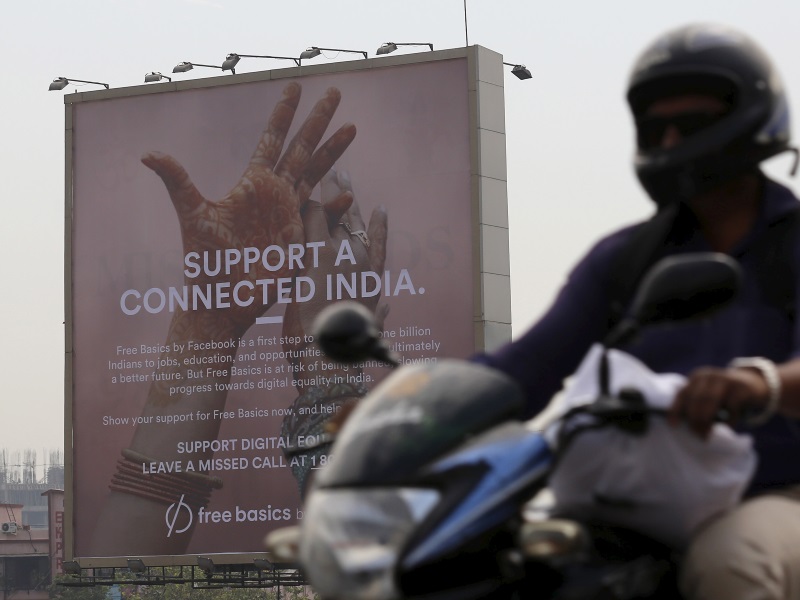- Home
- Internet
- Internet News
- Trai Says Facebook's Actions Could Have 'Dangerous Ramifications for Policy Making in India'
Trai Says Facebook's Actions Could Have 'Dangerous Ramifications for Policy Making in India'

The Telecom Regulatory Authority of India (Trai) is pulling no punches as it works out its latest consultation paper on net neutrality - specifically differential pricing for data services.
The Trai consultation paper on net neutrality has steadily devolved into an all-out argument between the regulator and Facebook. The latest development is that Trai has published a letter signed by K V Sebastian, Joint Advisor, Trai, written to Ankhi Das, Director Public Policy, India, South and Central Asia, Facebook.
In the letter, Trai tells Facebook in no uncertain terms that social network has been misleading its users with its Save Free Basics Campaign; that the responses sent by Facebook are not relevant to the questions being raised; and further writes, "your urging has the flavour of reducing this meaningful consultative exercise designed to produce informed decisions in a transparent manner into a crudely majoritarian and orchestrated opinion poll."
Facebook, which reportedly spent Rs. 300 crores on Free Basics ads in India, also used its social network to urge users to send a template-response to Trai's net neutrality paper. The result was a record 2.4 million submissions, the most that Trai has ever received. Facebook however claimed that it has sent 11 million responses, which Trai disputed.
Facebook has alleged that someone at Trai's office blocked email from its websites, preventing people from sharing their comments on the issue of differential pricing. Apprehending that the regulator may ban Free Basics, after Trai ordered Reliance to put it on hold in India. According to sources, Facebook in a letter on January 13 to the regulator has said that despite clear and timely efforts by millions of Indians to send their comments, "someone with access to designated Trai email account appears to have blocked receipt of all emails from Facebook to that Trai account."
It said that during its query its found that "on December 17 at 5.51.53 GMT, an individual with access to the Trai email account designated to accept comments took action that blocked Facebook from delivering any additional email to that address." Facebook said that the action by person prevented Facebook system from sending further response emails to Trai.
However, in its letter to Facebook, Trai rubbishes this complaint as well, asking why, if the email was really blocked since December 17, Trai was informed only on January 13, after the consultation process was over. "Trai should have been informed immediately for appropriate steps to be taken. In fact, a similar instance of user complaint regarding the non-functioning of an email address during the response period for this Consultation Paper was brought to the notice of Trai by individual stakeholders and the situation was immediately rectified. It is surprising that it took over 25 days for you to inform Trai of this."
Nonetheless, Trai Chairman Ram Sewak Sharma met with Facebook representatives on January 14, and agreed to take into account all the relevant responses that seek to answer the questions raised in the consultation paper, delivered to Trai in a pen-drive on January 14.
The last date for public comments on Trai paper was earlier December 30 which was later extended to January 7. Trai had urged Facebook to communicate a message to all users that responded to Trai's consultation paper. The response from Facebook was that it reached out to people who had commented through Facebook, and asked them to answer the four questions Trai raised. However, as Trai points out in the latter, the response is silent on whether the text of Trai's communication was shared. Trai's letter states: "The only reasonable inference that can be drawn from your communications in this regard, despite two efforts by Trai to request you for a clarification, is that the text of Trai's communication was not in turn conveyed by you to those who had sent responses to Trai using your platform."
Trai also blasted Facebook for subverting the letter and spirit of the consultation process, something it notes could have "dangerous ramifications for policy making in India". It notes, "You [Facebook] have not been authorised by your users to speak on behalf of them collectively. No disclosure in the act of sending a message to Trai using your platform to this effect has been issued to users."
The letter ends with Trai saying that this does not mean it will not take into account any "relevant" response from the comments submitted by Facebook on behalf of its users. Given the earlier comments of the letter, that's a pretty clear statement - that Trai is not going to be pushed around by Facebook, and will not allow its consultation process to turn into an opinion poll.
Written with inputs from PTI.
Get your daily dose of tech news, reviews, and insights, in under 80 characters on Gadgets 360 Turbo. Connect with fellow tech lovers on our Forum. Follow us on X, Facebook, WhatsApp, Threads and Google News for instant updates. Catch all the action on our YouTube channel.
Related Stories
- Samsung Galaxy Unpacked 2025
- ChatGPT
- Redmi Note 14 Pro+
- iPhone 16
- Apple Vision Pro
- Oneplus 12
- OnePlus Nord CE 3 Lite 5G
- iPhone 13
- Xiaomi 14 Pro
- Oppo Find N3
- Tecno Spark Go (2023)
- Realme V30
- Best Phones Under 25000
- Samsung Galaxy S24 Series
- Cryptocurrency
- iQoo 12
- Samsung Galaxy S24 Ultra
- Giottus
- Samsung Galaxy Z Flip 5
- Apple 'Scary Fast'
- Housefull 5
- GoPro Hero 12 Black Review
- Invincible Season 2
- JioGlass
- HD Ready TV
- Laptop Under 50000
- Smartwatch Under 10000
- Latest Mobile Phones
- Compare Phones
- Redmi Turbo 5
- Redmi Turbo 5 Max
- Moto G77
- Moto G67
- Realme P4 Power 5G
- Vivo X200T
- Realme Neo 8
- OPPO Reno 15 FS
- HP HyperX Omen 15
- Acer Chromebook 311 (2026)
- Lenovo Idea Tab Plus
- Realme Pad 3
- HMD Watch P1
- HMD Watch X1
- Haier H5E Series
- Acerpure Nitro Z Series 100-inch QLED TV
- Asus ROG Ally
- Nintendo Switch Lite
- Haier 1.6 Ton 5 Star Inverter Split AC (HSU19G-MZAID5BN-INV)
- Haier 1.6 Ton 5 Star Inverter Split AC (HSU19G-MZAIM5BN-INV)
-
 CERN Experiments Confirm Early Universe Behaved Like a Near-Perfect Fluid
CERN Experiments Confirm Early Universe Behaved Like a Near-Perfect Fluid
-
 NASA’s TESS Captures First Images of Rare Interstellar Comet 3I/ATLAS
NASA’s TESS Captures First Images of Rare Interstellar Comet 3I/ATLAS
-
 Daredevil: Born Again Season 2 OTT Release Date Confirmed: When and Where to Watch it Online?
Daredevil: Born Again Season 2 OTT Release Date Confirmed: When and Where to Watch it Online?
-
 The Wrecking Crew Starring Jason Momoa and Dave Bautista Now Streaming: What You Need to Know
The Wrecking Crew Starring Jason Momoa and Dave Bautista Now Streaming: What You Need to Know












